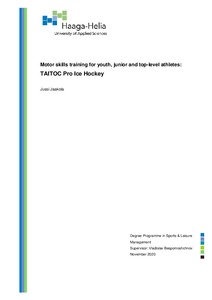Motor skills training for youth, junior and top level athletes : TAITOC Pro Ice Hockey
Jaakkola, Jussi (2020)
Jaakkola, Jussi
2020
All rights reserved. This publication is copyrighted. You may download, display and print it for Your own personal use. Commercial use is prohibited.
Julkaisun pysyvä osoite on
https://urn.fi/URN:NBN:fi:amk-2020111923375
https://urn.fi/URN:NBN:fi:amk-2020111923375
Tiivistelmä
The pace of ice hockey has increased over the past years and more demands are put on the
skills of the players. The player and the goalkeeper must have both the motor and cognitive
capabilities to face the challenges that emerge on the ice. As the game speeds up within
physical domain of execution, it is difficult to stand out. Nevertheless, enhanced observation,
faster decision-making and a well-developed coordinative ability can make a difference in
cognitive speed within sports performance.
Skill has traditionally been viewed largely through the lens physical constructs. Nowadays,
however, sports experts have started viewing skills from cognitive perspective as well. The same
elements can be seen within skilled performances, where movement solutions are always
slightly individual depending on game situations and one’s own methods of performing a skill or
task. Motor skills can be divided into different categories according to different classification
systems. Adaptive training, mastery of fundamental skills in a variety of settings, the
development of coordinative skills and the conditions of movements, have been shown to benefit
motor learning and development.
Sports analysis can be used to consider the kind of motor skills are specifically needed in ice
hockey and which skills contribute to the development of mastery of the skills required in this
particular sport to improve performance on ice and decrease the risk of overuse injuries. Motor
learning can manifest itself in several different ways as the learner’s development path is unique
and has a non-linear nature. Although, the end result is most often seen as an improvement in
the quality of physical performance, learning in development is as important contributor in
athletes’ journey.
Based on a sport analysis of ice hockey and motor learning theories, TAITOC Pro Ice Hockey
was developed as an off-ice motor skill training tool to promote transfer effect between physical
and sport specific motor demands of ice hockey skills. It consists of coach education materials
which include theory, skill assessment tools, and practice plans containing all materials.
skills of the players. The player and the goalkeeper must have both the motor and cognitive
capabilities to face the challenges that emerge on the ice. As the game speeds up within
physical domain of execution, it is difficult to stand out. Nevertheless, enhanced observation,
faster decision-making and a well-developed coordinative ability can make a difference in
cognitive speed within sports performance.
Skill has traditionally been viewed largely through the lens physical constructs. Nowadays,
however, sports experts have started viewing skills from cognitive perspective as well. The same
elements can be seen within skilled performances, where movement solutions are always
slightly individual depending on game situations and one’s own methods of performing a skill or
task. Motor skills can be divided into different categories according to different classification
systems. Adaptive training, mastery of fundamental skills in a variety of settings, the
development of coordinative skills and the conditions of movements, have been shown to benefit
motor learning and development.
Sports analysis can be used to consider the kind of motor skills are specifically needed in ice
hockey and which skills contribute to the development of mastery of the skills required in this
particular sport to improve performance on ice and decrease the risk of overuse injuries. Motor
learning can manifest itself in several different ways as the learner’s development path is unique
and has a non-linear nature. Although, the end result is most often seen as an improvement in
the quality of physical performance, learning in development is as important contributor in
athletes’ journey.
Based on a sport analysis of ice hockey and motor learning theories, TAITOC Pro Ice Hockey
was developed as an off-ice motor skill training tool to promote transfer effect between physical
and sport specific motor demands of ice hockey skills. It consists of coach education materials
which include theory, skill assessment tools, and practice plans containing all materials.
